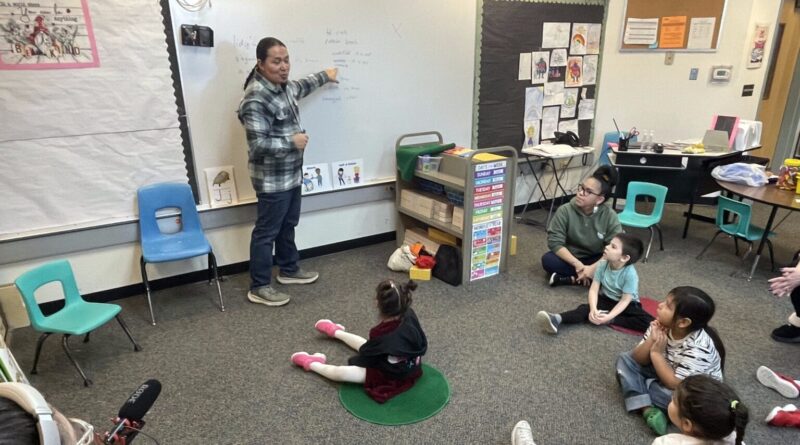‘Stories of Kake’ combines Lingít and English literacy with storytelling for students
Listen here:
Learning a language is hard. Learning a language without a teacher regularly checking in is even harder.
But this year, Kake City School District students got the chance to learn Lingít while creating multilingual poems that give people a glimpse of where they come from.
“I am from the air — daséikw. Salty — liéil’,” reads third-grader Jessica Padgett. “Like summer. Like fish — xáat. Cold winter, like ice water — si áat’i héen.”
Switching between English and Lingít, Padgett describes some sights and tastes of Kake in a poem about where she’s from.
This is part of “Stories of Kake,” a project where students from preschool to high school develop literacy skills in English and Lingít through storytelling.
Poems include descriptions of Kake through the five senses, including wildlife and food.
Third-grader Robert Wooten wrote about black bears in his part of the poem.
“I am from black bears — s’eek,” he reads. “They’re always by my creek. They are big. They are black. T’ooch’ yáx yatee. They eat coho — l’ook. They eat humpies — cháas’.”
These poems and more will be featured in a community event and an episode of “A Piece of Kake,” a podcast that features stories and culture of the people in Kake.
“Stories of Kake” began as a grant funded project to improve literacy for preschoolers in Kake, but it expanded to teach elementary and high school students Lingít through storytelling and poetry.
X̱’unei Lance Twitchell is an Alaska Native language professor at the University of Alaska Southeast. He’s the main language teacher for the project. Twitchell said he hopes to give students the skills to speak Lingít more in the community.
“Hopefully they’ll be able to share these words with each other and start communicating in the language with the language to one another, as we sort of try and create a transformation, where you create generations that just use the language more,” he said.
Padgett and the other students said their favorite part of the project was learning more Lingít. Padgett said they learned by making up movements for different words.
“We had music on and we just made up movements, and she said a word in Lingít and English, and we had to do the movement and walk around and do the movement,” Padgett said.
Ryan Conarro is one of the project leaders. He said having Twitchell there means he and classroom teachers are able to learn the language with the students.
“There’s a lot of enthusiasm in this school district for Lingít language, for project based learning. Lot of the classrooms have posters on the wall with Lingít language vocabulary, that the teachers are motivated and they also are looking for support,” he said. “And so we’re psyched that this project has provided some of that support, and that Sarah and I both come in and say, ‘Look, we’re like you. We’re also learning, but we’re going to try to be brave, and keep trying.’”
Sarah Campen is the other project leader and co-hosts the “Piece of Kake” podcast. She and Conarro are learning Lingít together alongside teachers and students with the project as Twitchell teaches the language. Campen said learning, making mistakes and improving together with students makes them more willing to try and improve. She said that’s shown in the podcast.
“One of my favorite pieces, is two students working with X̱’unei and working with Ryan, and saying some words over and over again, and just trying and practicing and not getting it quite right, but practicing and just seeing that evolution over time is so fun, because eventually we get better,” Campen said.
Kake City School District will hold the showcase at the school this Wednesday at 3:15. Campen said the podcast episode “Goodáx Xát Sáyá? / Where Am I From?” is expected to come out on the same day.

